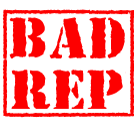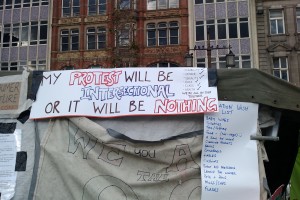I’ve been ridiculously busy lately (teaching! training! seeing Jen Gupta perform as part of Manchester Science Festival and London Bright Club! linguistics reading group! oh yeah, that thesis thing I’m writing! trying to get my boiler fixed!) so not really had time to think of interesting posts, so here’s a few links to blogs I read:
 Bad Reputation is a collective of writers on a “feminist pop culture adventure”. In the interests of transparency I should declare that they have plied me with cake, but I’d like them anyway because they’re incisive, intelligent and pretty awesome. I particularly like their series of Revolting Women because it contains not one, not two, but THREE posts about the suffrage movement: the Ju-Jutsuffragettes, Dora Thewlis, Teenage Working Class Suffragette and Joan of Arc, Rosie the Riveter, and the Feminist Protest Icon. They also write about films, comics, music and computer games in an interesting, thought-provoking and entertaining way. I actually LOLed at Markgraf’s illustrated review of The Three Musketeers and don’t feel the cinematic experience can begin to compare their final analogy involving pick-and-mix and “an enraged muskrat”.
Bad Reputation is a collective of writers on a “feminist pop culture adventure”. In the interests of transparency I should declare that they have plied me with cake, but I’d like them anyway because they’re incisive, intelligent and pretty awesome. I particularly like their series of Revolting Women because it contains not one, not two, but THREE posts about the suffrage movement: the Ju-Jutsuffragettes, Dora Thewlis, Teenage Working Class Suffragette and Joan of Arc, Rosie the Riveter, and the Feminist Protest Icon. They also write about films, comics, music and computer games in an interesting, thought-provoking and entertaining way. I actually LOLed at Markgraf’s illustrated review of The Three Musketeers and don’t feel the cinematic experience can begin to compare their final analogy involving pick-and-mix and “an enraged muskrat”.
Robert Lawson is a sociolinguist and brave soul who’s blogged about John Locke’s Duels and Duets in detail – part 1, part 2 and part 3. I’m reading this book for the reading group, mainly because I’m intrigued as to how a book on language and gender manages to cite Deborah Tannen but not Deborah Cameron. In the first chapter Locke cites John Gray’s Men Are From Mars, Women Are From Venus, Deborah Tannen’s You just don’t understand, a baffling amount of primate research, and an anecdote from Larry Summers. I almost did the drinking game but I think I’d have to have my stomach pumped. Anyway, you can read Robert’s excellent, informative posts on this book and so avoid reading the primary source. Even if it does mean missing out on the primate research.
 Lashings of Ginger Beer are a queer feminist burlesque collective who combine “songs, dancing, stand-up and sketches, luxe Victoriana drag with thigh-high fetish-boots, upbeat musical theatre optimism with 21st-century political rage”. Have a couple of videos: Acceptable, skewering Gok Wan, television makeovers, unrealistic gendered beauty ideals and the expense and effort of maintaining this beauty; Dead Girlfriend which comments on TV portrayals of queer relationships and the way the characters involved are punished. The Lashings of Ginger Beer blog posts about events and does link roundups, but also features posts by members of the collective. I was particularly struck by this post examining the different effects of performing with different dancers – it’s a really thoughtful analysis and highlights the experience of the performers.
Lashings of Ginger Beer are a queer feminist burlesque collective who combine “songs, dancing, stand-up and sketches, luxe Victoriana drag with thigh-high fetish-boots, upbeat musical theatre optimism with 21st-century political rage”. Have a couple of videos: Acceptable, skewering Gok Wan, television makeovers, unrealistic gendered beauty ideals and the expense and effort of maintaining this beauty; Dead Girlfriend which comments on TV portrayals of queer relationships and the way the characters involved are punished. The Lashings of Ginger Beer blog posts about events and does link roundups, but also features posts by members of the collective. I was particularly struck by this post examining the different effects of performing with different dancers – it’s a really thoughtful analysis and highlights the experience of the performers.
I was lucky to meet Jennifer Jones when we were both facilitators at Research Practices 2.0. Her reflections on that event are interesting, and have also shaped how she’ll facilitate social media workshops in the future; there are loads of ideas there about questioning the usual classroom hierarchy and enabling a flexible, responsive, collaborative way of learning. Jennifer’s research focuses on the Olympics and offers a much needed critical view on the ideology of the Olympics, which she explored in a recent talk at Tent City Uni. She’s also a very cool lady and it’s a joy to talk to her, whether that be over crappy university coffee, mugs of tea in an occupation or, indeed, over a pint.

